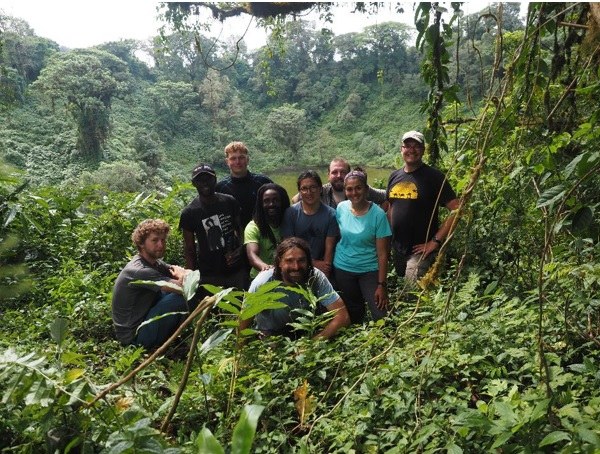Global analysis reveals the planet's most diverse forests
An international consortium of 249 authors from 50 countries collected data on more than 55 million trees in 1.3 million study plots, representing 97% of the world's forest ecosystems. As the authors of the study point out, the collection of this amount of data and subsequent analysis was made possible not only by the collaboration of a large number of scientific capacities from different countries and institutions, but also by the participation of scientists from otherwise overlooked tropical areas.
 Robert Tropek during biodiversity research in the forests of Mount Cameroon. Photo by Petra Janečková.
Robert Tropek during biodiversity research in the forests of Mount Cameroon. Photo by Petra Janečková.
Czech institutions involved in the research were the Faculty of Science of Charles University, a research group led by Robert Tropek and Štěpán Janeček, the Biological Centre of the CAS, the Institute of Botany of the CAS and several other Czech research institutions.
"The main authors of the study lacked data from the hard-to-reach mountains of Central Africa, so they invited us to join the consortium. We count and measure trees on Mount Cameroon in our long-term research on the relationships between plants and their pollinators, and in our studies of the diurnal and nocturnal butterflies of Mount Cameroon." Robert Tropek from the Faculty of Science of the Charles University and the Biological Centre of the CAS revealed.
The main result of the study is a detailed description of how the species diversity of trees in forests is increasing from the subarctic to the equator. The most interesting result is the discovery that tree species diversity in tropical ecosystems is much higher than predicted by previous models.
While most scientists, foresters and other experts have assumed that tree species richness depends almost exclusively on temperature and rainfall, a new study has shown that in tropical ecosystems, tree diversity is also strongly influenced by other factors, particularly soil conditions, terrain ruggedness in tropical environments and long-term human impacts on ecosystems. The combination of these factors plays a key role in the unexpectedly high tree diversity in tropical ecosystems.
"Among other things, the study has precisely located the most diverse tropical forests on Earth. The most species-rich forests turned out to be those in the Amazon, with more than 200 tree species per hectare. The most diverse temperate forests, with up to 50 species per hectare, are found in central Chile. Our Central European forests are relatively species-poor compared to similar latitudes in South and North America and Asia", said Štěpán Janeček from the Faculty of Science of the Charles University.
 A team of scientists and students from the Department of Ecology at the Faculty of Science of Charles University on Mount Cameroon. Photo Štěpán Janeček.
A team of scientists and students from the Department of Ecology at the Faculty of Science of Charles University on Mount Cameroon. Photo Štěpán Janeček.
 Štěpán Janeček during research on biodiversity of the forests of Mount Cameroon. Photo archive of Štěpán Janeček.
Štěpán Janeček during research on biodiversity of the forests of Mount Cameroon. Photo archive of Štěpán Janeček.
Such an extensive study of local forest diversity will also be important for conservation. It will make all data and statistical procedures available to the general public and will be used for the conservation of locally and globally valuable forest stands. Previously, such detailed data were missing or not centrally available for much of the tropical forest. It will now be much easier to prioritise and effectively protect forests. "Tropical forests are globally important ecosystems, but their current decline is unprecedented. This is also observed in long-term research projects in Cameroon and other parts of Africa", noted Robert Tropek.
The lead authors also produced a video abstract about the study and its significance.
Document Actions